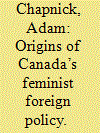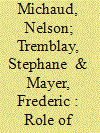|
|
|
Sort Order |
|
|
|
Items / Page
|
|
|
|
|
|
|
| Srl | Item |
| 1 |
ID:
167215


|
|
|
|
|
| Summary/Abstract |
In January 2019, a leading Canadian foreign policy blog, OpenCanada.org, declared that “[u]nder the government of Justin Trudeau, Canada has embraced a feminist foreign policy—gradually at first, and with fervor over the past year.” Although critics have debated the policy’s effectiveness, the embrace, if not also the fervor, was indisputable. By 2019, the Trudeau government’s second foreign minister, Chrystia Freeland, was proclaiming Canada’s feminist approach to international relations openly and regularly. The international community had also noticed. This article investigates the origins of the new Canadian foreign policy “brand.” It finds that, contrary to popular thinking, the prime minister himself played at most a minor role in the initiation of what became a full-fledged transformation of Canada’s global image.
|
|
|
|
|
|
|
|
|
|
|
|
|
|
|
|
| 2 |
ID:
178199


|
|
|
|
|
| Summary/Abstract |
Foreign policy statements—and, namely, white papers—offer diplomats, civil servants, and the general public, as well as international actors (friends and foes alike) an understanding of what motivates a country to engage in international issues. They are fundamental government declarations intended to direct the policy process toward its political and operational objectives. Is history embedded in the message these statements carry? And, if so, how is history used? Relying on Brands and Suri’s typology and framing categories (factual/normative), this article explores white papers issued by governments led by Pierre Elliott Trudeau, Jean Chrétien, Paul Martin Jr., as well as the 2017 House of Commons statement by Justin Trudeau’s foreign affairs minister, Chrystia Freeland. Based on Canada’s tradition of Pearsonian internationalism, we hypothesize that the factual use of history would prevail. We find this to be the case, but with important nuances.
|
|
|
|
|
|
|
|
|
|
|
|
|
|
|
|
|
|
|
|
|